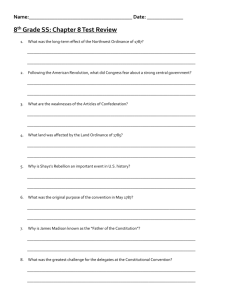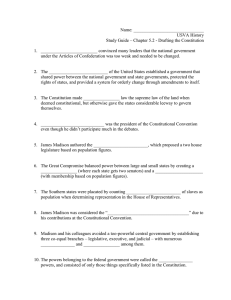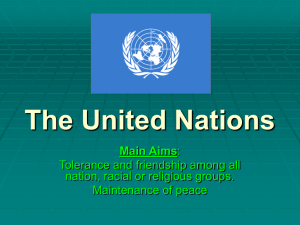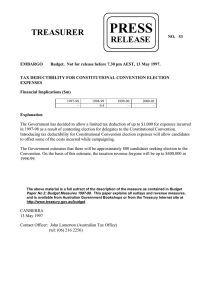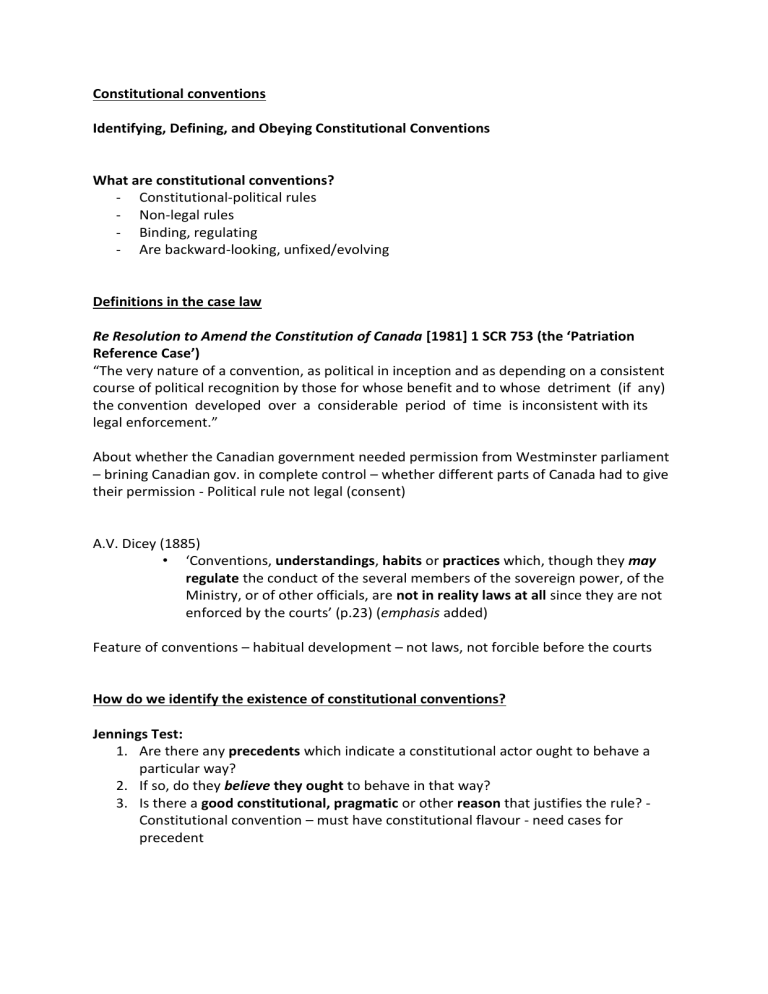
Constitutional conventions Identifying, Defining, and Obeying Constitutional Conventions What are constitutional conventions? - Constitutional-political rules - Non-legal rules - Binding, regulating - Are backward-looking, unfixed/evolving Definitions in the case law Re Resolution to Amend the Constitution of Canada [1981] 1 SCR 753 (the ‘Patriation Reference Case’) “The very nature of a convention, as political in inception and as depending on a consistent course of political recognition by those for whose benefit and to whose detriment (if any) the convention developed over a considerable period of time is inconsistent with its legal enforcement.” About whether the Canadian government needed permission from Westminster parliament – brining Canadian gov. in complete control – whether different parts of Canada had to give their permission - Political rule not legal (consent) A.V. Dicey (1885) • ‘Conventions, understandings, habits or practices which, though they may regulate the conduct of the several members of the sovereign power, of the Ministry, or of other officials, are not in reality laws at all since they are not enforced by the courts’ (p.23) (emphasis added) Feature of conventions – habitual development – not laws, not forcible before the courts How do we identify the existence of constitutional conventions? Jennings Test: 1. Are there any precedents which indicate a constitutional actor ought to behave a particular way? 2. If so, do they believe they ought to behave in that way? 3. Is there a good constitutional, pragmatic or other reason that justifies the rule? Constitutional convention – must have constitutional flavour - need cases for precedent Why obey conventions? The Jennings Test - Precedent = indicates expected practice, predictability, stability – behave consistent way into the future - Belief that they ought to be followed = indication that compliance is a requirement of legitimate action/constitutional - A good constitutional reason = suggests that for conduct to be constitutional it should align with the convention - Gives constitutional legitimacy, avoiding merely political judgment dictating the resolution of disagreements. - Supports legitimacy of democratic institutions, and harmonious inter-institutional relationships - Promotes institutional harmony Functions of conventions 1 - Regulate / guide behaviour in areas not suitable for legal regulation: The central structures of the constitution Day-to-day operations of government The exercise of power The relationship between different elements of the constitution The expected limits on the power of individual actors 2 Provide an indication of good constitutional practice in an area 3 Set or manage expectations based on past behaviour A) Conventions and the central structures of the constitution: 1 Establish/regulate the behavioural characteristics of Cabinet Government – not a lot of laws that regulate how central government operates – consequence of historical development, e.g. • Ministers must (normally) be members of the House of Commons or House of Lords 2 Create the office of Prime Minister and attach provisos to it, e.g. a. Must be a member of the House of Commons i. See Alec Douglas-Home, 14th Earl of Home until 1963 3 Specify the function of the Queen following an election, e.g. a. Queen must appoint person who can command confidence of the House of Commons B) Conventions and the day-to-day operation of government: - Curb the exercise of a power Ministers must answer questions in Parliament - Promotes collective cabinet accountability Individual ministerial accountability - Political head/politically responsible – if they make mistakes, they must leave office/resign C) Conventions and the exercise of power: - Define how a discretionary power can be used: Confidence of the commons / calling an election Fixed Term Parliaments Act 2011 D) The relationship between different elements of the constitution: The cardinal convention: - Queen can only act on advice of ministers - Foundation rule for constitutional monarchy Tripartite convention: - Important to how crown is conceptualised - Central element – queen should be consulted by government on doing certain things - Nothing she says to ministers should not be released whilst she is alive E) Conventions and the expected limits on the power of individual actors The powers of various actors, and their ability to intervene in public life are largely limited by constitution conventions: - The Sovereign - The Prime Minister - The Prince of Wales - Politicians vis-à-vis the judiciary - Senior members of the judiciary How are constitutional conventions created? The acceptance of expected practice - Evolutionary – not fixed – one rule where you do not have to follow old precedents because of evolution - Historical - ‘Tradition’ - Novel situations 1. Development by agreement: - Coalition Agreements - 2010 General Election (contrast with 1923 election and King George V’s involvement) - Hung Parliament - Normally have majority government or minority government, Lib dem joined conservatives – formed coalition 2. Development by changing circumstanced – e.g. Salisbury convention, 19th century – third Marquess of Salisbury thought the lords could block bills and ask they be retested at an election 3. Development by acceptance: e.g. the mistrial code - The test for ministerial propriety depended on the expectations of the political community around Westminster 4. Development by disregarding/suspending a convention – certain convention scan be suspended by agreement or unilateral action – collective responsibility provides unified gov/hold them to account – e.g. agreements to differ 5. Development in the face of political reality: e.g. 2010 general election, Gordon Brown 6. Codification: Ponsonby rule: - Originally a historical practice Concerns parliamentary oversight of government treaty making functions In order to giving treaties – gov had to look over them first Can say what the requirements are but not how it should be enforced Codified in primary legislation Binds more explicitly Ministers to a particular procedure while the Act remains in force Conventions and laws 1. - Conventions: Not directly legally enforceable A product of practice and tradition developed over time Sometimes necessary to understand legal provision Inform/guide practice and behaviour of constitutional actors Conventions are flexible A creature of uncodified constitutions alone? A product of the continuous, evolutionary quality of the British constitutional context? Perhaps a dangerous, or at least risky, means of holding political actors to account? Relies on good manners, honesty, and selfless, non-partisan politics Consequences for breaching conventions? a) Political - If you breach constitutional convention - Respect for the constitution may act to moderate and modulate responses to conventions - Ignoring a convention could cause political difficulties - Not clear who determines if a convention should be followed whereas w/ law much clearer – the court system b) Legal/laws - Some breaches of convention are also breaches of the law - Beyond this situation there are no obvious legal sanctions for breaching a convention e.g. parliament should meet regularly - Not clear who determines that a convention applies - If you breach convention – no legal sanction 2. Laws: - Enforceable before the courts - Are a product of legislative process, common law precedents, and other historical legal powers – judgements handed down - Determine appropriate practice and behaviour by setting standards and regulating alignment w/ them

